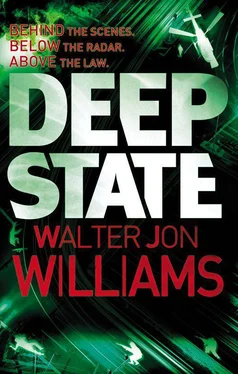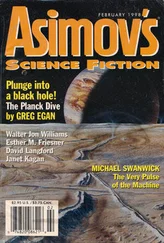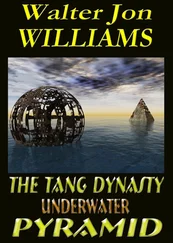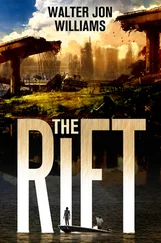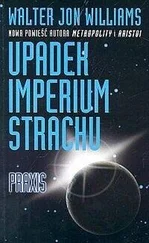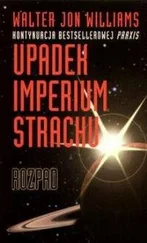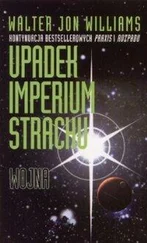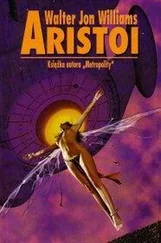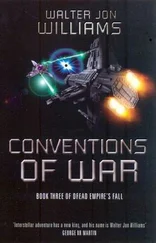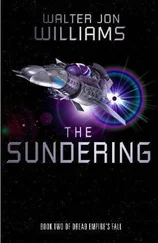Walter Williams - Deep State
Здесь есть возможность читать онлайн «Walter Williams - Deep State» весь текст электронной книги совершенно бесплатно (целиком полную версию без сокращений). В некоторых случаях можно слушать аудио, скачать через торрент в формате fb2 и присутствует краткое содержание. Жанр: Киберпанк, на английском языке. Описание произведения, (предисловие) а так же отзывы посетителей доступны на портале библиотеки ЛибКат.
- Название:Deep State
- Автор:
- Жанр:
- Год:неизвестен
- ISBN:нет данных
- Рейтинг книги:5 / 5. Голосов: 1
-
Избранное:Добавить в избранное
- Отзывы:
-
Ваша оценка:
- 100
- 1
- 2
- 3
- 4
- 5
Deep State: краткое содержание, описание и аннотация
Предлагаем к чтению аннотацию, описание, краткое содержание или предисловие (зависит от того, что написал сам автор книги «Deep State»). Если вы не нашли необходимую информацию о книге — напишите в комментариях, мы постараемся отыскать её.
Deep State — читать онлайн бесплатно полную книгу (весь текст) целиком
Ниже представлен текст книги, разбитый по страницам. Система сохранения места последней прочитанной страницы, позволяет с удобством читать онлайн бесплатно книгу «Deep State», без необходимости каждый раз заново искать на чём Вы остановились. Поставьте закладку, и сможете в любой момент перейти на страницу, на которой закончили чтение.
Интервал:
Закладка:
Tuna turned, saw the students pouring into the square, and practically ran to join them, waving his bouquet like a marshal’s baton.
Tuna had not been in contact with any of these people. He didn’t know any of them, and they didn’t know him.
They were the faceless members of an orchestra that Tuna would try to conduct.
Over the heads of the students, a banner unrolled. GENERALS OUT! it said, in English.
Whoever had written it seemed fully aware of the practical necessities of modern international communication, among them the requirement that it be done in a language other than Turkish.
The girls in headscarves had joined the crowd, offering their pot of flowers. People brandished cell phones and snapped pictures. More banners and signs were raised. The pushcart vendors watched in surprise as the square began to fill. Tuna dipped into his shopping bag and pulled out an electric megaphone. Dagmar winced and turned down the volume on her headset as Tuna began bellowing instructions to the crowd.
Dagmar had a good idea what Tuna was telling them. In answer to his call, the crowd began to break into smaller groups.
Make a memorial to the victims of the regime! That’s why they had been instructed to bring flowers-a token that did double duty, as identification, so that people would know not to trust anyone who hadn’t turned up with the proper tokens
Flowers began to be piled into pyramids, scattered into elaborate designs. Photos were added to the pictures-photos of exiled or imprisoned politicians, national heroes like Ataturk, movie or pop stars, sports figures cut from the pages of newspapers or magazines.
While this was going on, Tuna led a group, including most of those carrying signs, to block Ordu Road on the southern perimeter of the square. If the blocked traffic backed up, police would have a much harder time getting through the demonstration.
The crowd began to sing. The song was in march time and everyone knew the words, so Dagmar assumed it was patriotic.
Blocked traffic on the road honked. Dagmar had spent enough time in Turkey to know the language of the auto honk, which ranged from the little blip that said, in a perfectly friendly way, Hey, I’m here! to the deliberate long honk that meant, Get out of the way, and the more persistent repeated blasts that might mean, You are an idiot, or I have found your attitude deficient and will very shortly correct it in a vigorous manner.
The auto horns on Ordu Road progressed through all these stages and then fell into baffled silence. The patriotic singers marched on. Bouquets waved in time to the music. A tram bell rang repeatedly offscreen, but the tram never appeared-apparently jammed autos had blocked it.
The crowd kept getting bigger. Passersby, without flowers or photos, were inspired to join the party. The group finished the song and started on another. Cell phone cameras captured everything.
One of the cameras in the hotel rooms jerked, then shifted and refocused. Dagmar tensed at the sight of a pair of police standing a couple hundred feet down Ordu Road. They were watching the demo with interest and speaking on their walkie-talkies, but they seemed disinclined to interfere.
The fact that they were heavily outnumbered might have contributed to their passive stance.
Dagmar told Tuna about the cops.
“Okay,” he said. He didn’t sound very alarmed and craned his neck to observe the police who were, at that instant, observing him.
“We’ve got a police drone over the square,” Lloyd said. “We’re going to try to take it down.”
Dagmar drifted over to Lloyd’s station, looking over his shoulder at his multiple screens, each relaying the images sent by one of the drones of the Anatolian Skunk Works. Lloyd pressed one image, and it expanded to cover two screens. The target drone, painted the same shade of blue and white as a police car, floated against a background of gray cloud, its starboard wing dipped as the drone circled the demonstration at Beyazit Square. The picture from the Skunk Works wedge was poured through colossally fast, efficient processors, and it came out as brilliant and clear as if it were being lit and shot by Hollywood professionals.
The hunter-killer wedge hovered closer, and now Dagmar could read POLIS written on the fuselage of the craft.
Lloyd spoke to the wedge operator in Turkish, and the machine oriented itself carefully, then raced forward.
There was a sharp, blurry succession of images, too incoherent for even the fast image processors to make sense of. The horizon seemed to flip a couple times, and then the wedge’s guidance program took over, and suddenly it was sailing upright, apparently undamaged, through the sky.
Lloyd punched a fist into the air.
“Wedges rule!” he said-and then something caught his eye, and he pressed another image to enlarge it, succeeding just in time to catch an image of the broken police drone, one wing spinning in its slipstream, as it caromed off the roof of a stalled tram.
We own the skies, Dagmar thought incredulously.
The demo went on. More people kept joining, most carrying bouquets, some attracted by texting friends. A young woman, laughing at her own daring, ran up to the two police and handed them each a bouquet. The police politely accepted, and the girl ran back.
“Like wow,” said Lincoln deliberately. “I just had a sixties flashback.”
There was the hoot of a police siren, and another police officer on a motorcycle came weaving through the stalled traffic to join the two police. Dagmar guessed the officer on duty had arrived. He chatted with the two cops, then spoke into his lapel mike.
“They’re mounting up,” Richard said. He pointed at the camera fixed at the Mustafa Kemal station. Police were leaving the station, piling into vehicles, motorcycles, and a bus. They wore riot gear, helmets and body armor and plastic shields. Automatic weapons were strapped across their chests.
Dagmar shivered as memory stroked her spine with soft, cold fingers.
Even before the coup, Turkish police had routinely used torture on suspects. “Usually just the ones they think are guilty,” Lincoln had said, with small comfort. Suddenly Dagmar felt a strong need to get everyone in the demo to safety.
“Tuna, time to break it up,” Dagmar called. “Police coming up Mustafa Kemal.” She saw Tuna nod, then raise the megaphone to his lips and bellow orders. The people near him reacted.
Tuna walked back onto the square, shouting. The singing faltered but then strengthened again as the people got the message and began to disperse.
The signs and banners, and flowers and photos, were left behind, brilliant color against the rough gray stone of the square, beneath the big Turkish flag that flew before the university gate. There were pyramids of blossoms, photos of celebrities laid out in suggestive couplings, flowers that spelled out political messages, pictures of the junta defaced with mustaches and beards and devil horns, blooms that formed the Turkish star and crescent, serpents of flowers with human photo heads…
The pushcart vendors, covered in flowers, stood amid the colorful debris with smiles on their faces. They’d done good business amid the holiday atmosphere.
One of the advantages of the Beyazit Square location was that there were so many ways to leave the area. People could retreat back into the huge university complex or head across Ordu Road into an area filled with hotels and tourists, places where police might be reluctant to charge. They could go into the Beyazit Mosque that stood on the east side of the square. A few paces farther was the Grand Bazaar, with its maze of narrow streets and its hundreds of shops.
Once they’d dropped their bouquets and photographs, the members of the crowd carried nothing that would mark them to the police, particularly if they dropped the hats and scarves and masks they’d used to shroud their identities.
Читать дальшеИнтервал:
Закладка:
Похожие книги на «Deep State»
Представляем Вашему вниманию похожие книги на «Deep State» списком для выбора. Мы отобрали схожую по названию и смыслу литературу в надежде предоставить читателям больше вариантов отыскать новые, интересные, ещё непрочитанные произведения.
Обсуждение, отзывы о книге «Deep State» и просто собственные мнения читателей. Оставьте ваши комментарии, напишите, что Вы думаете о произведении, его смысле или главных героях. Укажите что конкретно понравилось, а что нет, и почему Вы так считаете.
